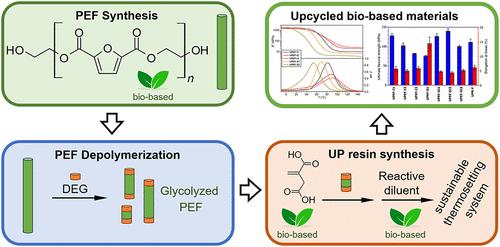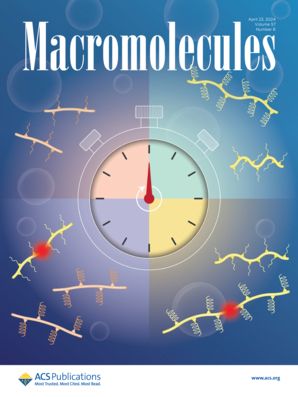解聚聚乙烯-2,5-呋喃酸酯作为生物基不饱和聚酯树脂的可持续原料
IF 5.2
1区 化学
Q1 POLYMER SCIENCE
引用次数: 0
摘要
本研究描述了聚乙烯醇-2,5-呋喃酸酯(PEF)废物的化学升级回收成生物基热固性材料。采用熔融聚合-固态聚合法制备了特征黏度为1.04 dL/g的高摩尔质量PEF,作为消费后PEF的模型。表征后,PEF通过糖酵解聚得到端羟基低聚物混合物,适合作为生产不含苯乙烯的不饱和聚酯树脂的原料。在一系列使用生物基衣康酸作为聚酯不饱和源和生物基衣康酸二甲基作为反应性稀释剂的配方中,它得到了例证。固化配方的机械和热分析测试表明,以这种方式生产的生物基材料可以作为目前工业中使用的化石基聚酯树脂的同等替代品。本文章由计算机程序翻译,如有差异,请以英文原文为准。

Depolymerized Poly(ethylene-2,5-furanoate) as a Sustainable Feedstock for Biobased Unsaturated Polyester Resins
This study describes the chemical upcycling of poly(ethylene-2,5-furanoate) (PEF) waste into biobased thermosetting materials. High molar-mass PEF of intrinsic viscosity of 1.04 dL/g, serving as a model of postconsumer PEF, was synthesized by melt polymerization followed by solid-state polymerization. After characterization, PEF was depolymerized by glycolysis to give a mixture of hydroxy-terminated oligomers suitable as a raw material for the production of styrene-free unsaturated polyester resins. It was exemplified in a series of formulations that use biobased itaconic acid as a source of polyester unsaturation and biobased dimethyl itaconate as a reactive diluent. Mechanical and thermoanalytic testing of the cured formulations indicates that biobased materials produced in this way can serve as an equal substitute for fossil-based polyester resins currently used in the industry.
求助全文
通过发布文献求助,成功后即可免费获取论文全文。
去求助
来源期刊

Macromolecules
工程技术-高分子科学
CiteScore
9.30
自引率
16.40%
发文量
942
审稿时长
2 months
期刊介绍:
Macromolecules publishes original, fundamental, and impactful research on all aspects of polymer science. Topics of interest include synthesis (e.g., controlled polymerizations, polymerization catalysis, post polymerization modification, new monomer structures and polymer architectures, and polymerization mechanisms/kinetics analysis); phase behavior, thermodynamics, dynamic, and ordering/disordering phenomena (e.g., self-assembly, gelation, crystallization, solution/melt/solid-state characteristics); structure and properties (e.g., mechanical and rheological properties, surface/interfacial characteristics, electronic and transport properties); new state of the art characterization (e.g., spectroscopy, scattering, microscopy, rheology), simulation (e.g., Monte Carlo, molecular dynamics, multi-scale/coarse-grained modeling), and theoretical methods. Renewable/sustainable polymers, polymer networks, responsive polymers, electro-, magneto- and opto-active macromolecules, inorganic polymers, charge-transporting polymers (ion-containing, semiconducting, and conducting), nanostructured polymers, and polymer composites are also of interest. Typical papers published in Macromolecules showcase important and innovative concepts, experimental methods/observations, and theoretical/computational approaches that demonstrate a fundamental advance in the understanding of polymers.
 求助内容:
求助内容: 应助结果提醒方式:
应助结果提醒方式:


